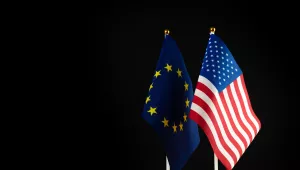
Donald Trump’s preposterous fixation with buying Greenland, initially treated as a distraction by American media and a joke by the Danish government, became less amusing Tuesday night when the president declared that he would be canceling his planned diplomatic trip to Denmark in retaliation. Prime Minister Mette Frederiksen had told the White House, that Greenland, an autonomous territory in the Arctic, wasn’t Denmark’s to sell.
“Sometimes it is hard to believe that what Trump is saying and doing on the world stage is actually happening,” said Nicholas Burns, the former U.S. ambassador to NATO. “This is one of those days.” Denmark, after all, is a key partner in the North Atlantic alliance, and was among the first countries to pledge military support in Iraq and Afghanistan. More than 40 Danish troops died in Helmand province, fighting alongside American and British soldiers.
“I realize this is yet another bizarre and humorous Trump moment for the late night talk shows here in the U.S.,” Burns told me. “But, for the rest of the world, particularly our allies, it is simply shocking how far America has fallen from grace in their eyes.”
The Wall Street Journal first reported last week that the president had been asking his advisers about buying up the island, which Trump later described as “essentially, it’s a large real estate deal.” According to the Washington Post, Trump had been flirting with the idea for weeks and had even discussed taking over Denmark’s annual $600 million subsidy to Greenland in perpetuity, and possibly tossing in an additional large payment to sweeten the deal.
That Denmark has no interest in cutting such a deal shouldn’t have come as a surprise to the White House. For one, the idea makes little sense from a logistical perspective. “Denmark can’t sell it because it is a protectorate.... it is not even up to them,” explained Brett Bruen, a former Foreign Service Officer. The U.S. already leases land in Greenland to support the Thule Air Base. And Greenlanders—all 56,000 or so of them—would presumably see little reason to exchange their current head of state for a man who couldn’t find Greenland on a map.
“It is truly bizarre. On one level I am surprised that he even knows Greenland exists and beyond that, that he knows it belongs to Denmark,” a former high-ranking State Department official told me. This person, who was involved in the Thule negotiations, continued, “My biggest takeaway is how tough the Greenlanders were in insisting on their rights and to a great degree independence from Denmark, NATO and the [United States Government]. ‘Acquiring’ Greenland is much, much, much more than buying Alaska. It has a strong, self aware local government that will get a say in this as well and it won’t be pretty.”
Even for Trump, no stranger to diplomatic ineptitude, the Greenland episode has been particularly head-spinning. And while it is easy to laugh at the absurdity of the proposition, it has left the diplomatic community stunned. “I can’t think of anything like it. And I wish I could explain it,” a second former high-ranking State Department official told me. When the president’s fascination with acquiring the territory was first reported, the official’s first thought was “that the news media was silly to fall for it—chasing after that story instead of staying focused on the really big issues of the day.”
But the episode has also been clarifying. In many ways, Trump’s spat with Denmark embodies what the “America First” doctrine really is. “It is an illustration of how diplomacy has been completely siloed into Trump,” Bruen said. “Someone gets in the president’s head or maybe he just looked at a map, saw Greenland and thought, Why don’t we own it? And nobody bothered to say, Mr. President, it’s not ours to own.”
The deeper concern, diplomats say, is the lasting impact on U.S. foreign policy. The petulant decision to cancel the Denmark visit is the latest example of Trump dismissing allies when they don’t bend to his whims. “It is simply ludicrous for Trump to cancel a state visit to Denmark because its leader won’t agree to sell off part of her country to him,” Burns said. “The image Trump is projecting to the rest of the world is that of a world class bully who belittles a NATO ally that has always been a loyal friend, including by sending troops to Afghanistan and supporting the U.S. for decades on issue after issue.”
Will U.S. allies wait out Trump until someone else sits in the Oval Office? Or will they move on without us? “We were once a great democratic nation, the world leader. Part of what made us great is that we led with dignity. Our past presidents treated our allies with respect. He has made us a laughing stock,” Burns continued. “We Americans need to reflect on how much damage he is doing to our credibility in the world. Four more years of this will fundamentally weaken us and do lasting damage to our global reputation.”
The second former State Department official expanded on the idea. “I do think the capricious cancellation of a visit does hurt relations with a longtime reliable NATO ally, Denmark, and by extension with other European partners. It needlessly insults a country that is small and [has] been a steady partner for years and furthers the impression that he isn’t a serious or reliable partner, that he is just a capricious lightweight,” they said. “The lasting impression doesn’t help the United States’ reputation as a good partner and ally. Other nations, not just Europeans, will notice. And will wonder. And possibly think twice before seriously engaging POTUS or his team.”




